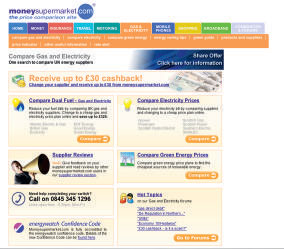The online insurance price-comparison sector is somewhat reminiscent of the directory enquiries market in the wake of its deregulation in 2003. The main players are busy trying to build their brands, investing greater amounts in marketing, and all are especially keen to point out the failings of their rivals.
The latest site to announce that it is to launch a TV ad campaign is Gocompare.com, a relative newcomer to the market, which appointed EHS Brann Cirencester last week. The company won't reveal its spend, but it will need deep pockets to take on market leader Moneysupermarket.com, with its estimated £16m budget, or to eat into Comparethemarket.com's TV presence, which has been boosted by its £5m sponsorship of Channel 4 drama.
There are two key reasons behind the increase in the sector's marketing spend. The first is that as more firms enter the market, brand stand-out becomes more difficult. Consumer interaction with insurance brands is, typically, confined to the purchase of two policies each year: car and home. So once a brand has built its presence, it must then maintain it to ensure that it is front of mind at that moment of purchase.
The second reason, and more worrying for the brands concerned, is the expected launch in the autumn of a Tesco-badged price-comparison site, which, as with all the retailer's other financial services, is a joint venture with Royal Bank of Scotland.
No one is underestimating the potential impact of Tescocompare. Hayley Parsons, founder and managing director of Gocompare.com, admits that it has influenced her company's activity. 'We have increased our business plans substantially,' she says.
A former head of business development at Confused.com, Parsons set up Gocompare.com last November, and has more sector experience than most. 'It is a difficult market,' she says. 'Tescocompare was due for a soft-launch in June/July and still has not made it, so even it has underestimated the work involved in setting up.'
Tesco has built a strong reputation in financial services since establishing its first joint venture with RBS in 1997. This latest initiative puts the bank in an interesting position. Among its insurance brands are Direct Line, Churchill and Privilege, none of which, as the result of RBS policy, have appeared on any price-comparison sites to date. RBS is tight-lipped about how this situation might change, but industry insiders predict that all bar Direct Line will appear on Tescocompare.
Direct Line has provided a unifying focus of loathing for the comparison sites, and the feeling is mutual. In June, the brand released research showing that 93% of people who used comparison sites believed that they should carry warnings that the searches conducted do not cover all suppliers. Direct Line continues to position itself as being cheaper because consumers deal with it direct and not via 'middlemen', be they brokers or comparison sites.
Not surprisingly, those in the price-comparison sector beg to differ. 'Direct Line is not on price-comparison sites because it's not competitive any more,' says Richard Mason, joint managing director of Moneysupermarket.com. 'If it was, consumers would see it is expensive and it would lose its reputation quickly.'
Tom Bennett, marketing director of Admiral-owned Confused.com, agrees. 'The "we go direct" message worked very well when it launched and was pioneering 10 years ago, but now it's a totally different environment,' he says. 'Direct Line lumps us together with brokers and is not willing to have a conversation with us. We compare 97% of the market; the missing 3% is the RBS Group.'
Nonetheless, Direct Line is not alone in its criticism of the sites. Transparency is an issue, both in terms of how comprehensive their offerings are and who owns them; some sites - Confused.com, for example - are owned by insurance groups, which is not always made clear.
The biggest consumer bugbear has been the discrepancy that has often occurred between the premium listed on the sites and the figure eventually quoted by the insurer. The sites have sought to address this by asking more detailed questions and improving search facilities. All now claim that the premiums shown in their listings are accurate.
The presence of comparison sites has also skewed the market, with insurers paring down their policies to appear the cheapest on the best-buy tables, according to Parsons.
'Insurers are becoming more creative with the policies they introduce in order to get to the top of the league tables,' explains Bennett. 'It has been a challenge for sites if they don't include certain things that are considered part of standard cover.'
As a result, Confused.com now offers companies one free line of advertising to exert other influences on buyers beyond price. This might include the offer of free MOTs or breakdown cover, for instance.
In addition, Parsons says one of the reasons she decided to set up Gocompare.com was to create a facility that compared policies not just on price, but on the products themselves. 'We give results on price, but users can play around with add-on products and find the best policy for them, which isn't necessarily the cheapest,' she explains.
As the market flourishes, some see consolidation as inevitable over the next year. Whatever the outcome and despite the fight for customers, fewer than 20% of consumers buy their car insurance online. This means that for those with sufficient budgets and stamina, there is still a huge untapped market
up for grabs.


